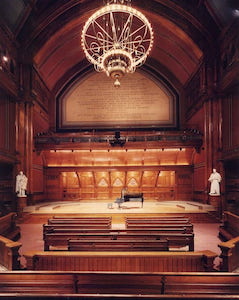A Listener’s Predicament (Also, A Concert Review)
|
Grant Chu Covell [March 2023.]
Time was I expected concerts to be exalted occasions. Motionless in our seats, attendees would be quiet, rapturously attentive and properly appreciative at all the right moments. I am now embarrassed at my youthful self when I would have sneered at interrupters, or in one unfortunately memorable occasion, when I shouted down a nervous man in a nearby seat who was probably suffering deeply from nicotine withdrawal. But we have had a pandemic and a cessation of normal concertgoing. And well before that my own children engendered a practical approach to musical happenings. I would like to think I have become a mellower concertgoer. I have experienced a gamut of interruptions including fire alarms, actual fire and an on-stage death. I would not say that I have accepted Cage’s world view and now treat all goings on as music, but I have become more accepting of fidgeters, the deluded who think they can stealthily unwrap a lozenge, and the worst offender, the patron who pretends it isn’t their phone ringing. While I do admire the impossible purity provided by engineered recordings, live events really are more satisfying for the combination of serendipity and determinism. Nowadays, I feel lucky to leave the house, and am mildly delighted (but equally apprehensive) to gather with strangers and be united and reasonably attentive to a prepared performance. Greater Boston is home to several excellent venues. Sanders Theatre in Cambridge, on the Harvard campus, is a particular pleasure, essentially a wooden semi-circle with two levels of seating and fine acoustics. There’s a big Latin dedication above the stage to puzzle out, and two marble sculptures to stare at. I have heard family members here, as well as Berio delivering a few of his Norton lectures enhanced with memorable Sequenze performances: the lecture of October 20, 1993, assisted by Eliot Fisk and Carlo Chiarappa stands out particularly. Across the street from Sanders Theatre is a fire station which can be counted upon to provide unexpected accompaniment. Part of attending a concert at Sanders is knowing that you will eventually hear a siren. As mentioned before, I am so surprised we are all able to gather, and am prepared to take the crying children and passing ambulance in stride. So it was on February 10, 2023, for an eagerly anticipated concert at Sanders Theatre, Klangforum Wien who I have heard in countless recordings, appeared on these shores under the auspices of the Fromm Music Foundation. The concert offered two pieces: Prozession (2015; rev. 2020) by Enno Poppe and The Fabrication of Light (2019-20) by Chaya Czernowin. Johannes Kalitkze conducted. I believe I had a solid understanding of both composers ahead of the evening. There has not been much Poppe reviewed on these pages because I have found it uneven (despite a recent attractive looking series on Wergo). Czernowin impressed two decades ago but recent works haven’t garnered the same enthusiasm. I was in the hall because of Klangforum Wien, not because I was especially excited to hear hourlong works by either composer. On the surface, these were forbidding, dissonant and noisy pieces delivered by a leading specialist ensemble. Long might be the neatest summary. But they are a dissimilar pair. The Poppe was limber, absorbing and musical. The Czernowin was garish and insulting, the audience thinning out as the hour progressed. With four encumbered percussionists spread across the stage, Poppe’s opening patter recalled antiphonal effects by Nono (or even Gabrielli). Two keyboards and an electric guitar contributed a microtonal spiciness. There was an engaging duo between low winds (the ensemble swaps bassoon for alto sax) and an interesting trombone solo. The work was long, but the players could focus their efforts on musical shapes. In contrast, it felt as if Czernowin was tricking all of us. Near the center of her opus, loud electronic static seizes the focus. In Sanders this din was aggressive and intimidating, drowning out the onstage musicians (which seemed either an intentional ruse or Kalitzke’s failure to command balances). There’s also a point where the players mumble into paper cones. In 2023 this had better have some meaning, otherwise it’s just silly. I peeked at the score: “Raise the cone and speak in a low voice about your childhood.” Seriously?! The entire piece seems to be a stumbling stream of avant-garde gestures failing to arrive at musical conclusions, despite the composer’s detailed instructions. I may have appreciated the sentiment more decades ago, but then again, Czernowin’s recent work behaves so differently to me. I wonder about the audience. Who attends these sorts of concerts? Who has the patience to endure it all? How many people possess the background to appreciate (or disdain) what they are experiencing? Beyond the local contemporary music scene (which I have always thought of as staunchly provincial), this was hardly date-night material. I believe I heard a fair bit of German in the crowd, so perhaps the Goethe-Institut had spread some publicity. I don’t go to enough of these events to recognize the region’s movers and shakers. Your reluctant reviewer is determined to remain anonymous. Apprehensively reading others’ reviews here and here, I am certain few want to admit unevenness or boredom. Plenty of paragraphs describe without providing opinion, as if chronicling the event required treating the evening as evidence in a perfunctory insurance claim. What do these pieces tell us about music today? About where music is going and where it has been? I can’t possibly be the only listener with such thoughts. Other reviewers’ conclusions do not fascinate me. I am sad that no one is willing to call out deception and silliness. But who cares? Regardless, it was a treat to hear such a fine ensemble in the space, regardless of the pieces played.
[More Grant Chu Covell]
[Previous Article:
Partly Present]
[Next Article:
Used Bin Troll Tweets NNN.]
|
